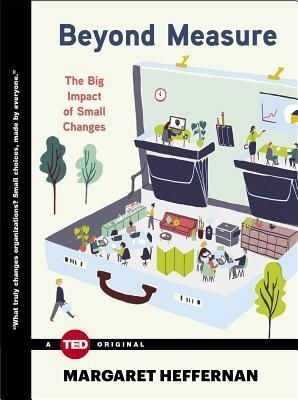
“Beyond Measure – The Big Impact of Small Changes” by Margaret Heffernan (Simon &Schuster, $16.99).
When measuring results at work, we look to numbers (e.g. revenue, expenses, profit, return on investment, turnover, etc.). But what really drives the numbers? The actions, habits, behaviors and egos of the CEO down the line to the low-level staff. The firm’s culture plays a huge role, too, because it frames choices, which affect organizational decisions.
Heffernan’s “just culture” encourages ideas, questioning, listening and knowledge-sharing. It connects personal goals to organizational goals through collaboration. In such an environment, leadership at all levels has “the courage to think and speak for oneself and on behalf of others.”
Those not in leadership positions learn to lead themselves based upon their leaders’ examples.
A just culture seeks conflict resolution by looking at conflict constructively. It relies on 3 I’s – information, intelligence and insight — to guide the decision-making process.
Only from questioning can “better ideas emerge, honed by the clash of disciplines and the friction of divergent minds.”
Heffernan believes that the devil’s advocate role can be a valuable one in the process. By taking the negative, the devil’s advocate gets others thinking deeply about the 3 I’s. She advises that the devil’s advocate’s role should be a revolving one because it’s “an experience everyone needs to refresh his or hers thinking.”
A just culture capitalizes on social capital (i.e. trust, respect, reciprocity) to make things happen. When people know each other, they become connected teammates.
She cites a situation where coffee breaks at a call center produced $15 million in productivity gains. By requiring teammates to take a coffee break at the same time, the team came together because it built social capital.
Just cultures recognize that no one can be “on” 24/7. Everyone needs time to relax. A short walk does more for productivity than staying late at work. Five minutes of periodic silence/meditation can do the same. Volkswagen turns off email during nonbusiness hours; Huffington Post urges employees not to check company email when not in the office.
Question to answer: “What small change can make a big impact on my work and that of others?”
“Relevance: The Power to Change Minds and Behavior and Stay Ahead of the Competition” by Andrea Coville with Paul B. Brown (Bibliomotion, $26.95).
In marketing, eyeballs, likes, tags, clicks, etc. don’t really matter. When your message doesn’t resonate with a specific target, it’s irrelevant.
Coville outlines the three intertwined dimensions of relevance:
1. Segment: Trying to be all things to all consumers means you’re nothing to anyone. Focus on satisfying core consumers — the ones that will be brand-loyal. Coke drinkers won’t switch to Pepsi and vice versa.
When expanding, don’t ignore underserved niches within large, well-established markets.
Initially, TOMS carved out a sizable niche in shoes with its unique “helping others” message. It expanded into eyewear and coffee with the same message; customers have followed because they believe in the TOMS message.
2. Intangibles: People must believe they’re receiving value when they purchase.
Although perceived value differs among consumers, the principle applies to all. Part of that perception involves appearance, not only of the product but also its packaging and the service.
The opinions of family, friends and other users play a value role, too. Social media has made it easy to find out what they think. You can ask questions and read product reviews.
3. Circumstances: This deals with the content (words and pictures that attract and explain), context (time and space where people are apt to pay attention) and contact method (demographic communication source).
Things to do Monday morning:
1. Rate your product/service on the relevance of its message.
2. Ask clients and prospects to rate it.
3. Compare the connects and disconnects.
Jim Pawlak is a nationally syndicated reviewer of business books.